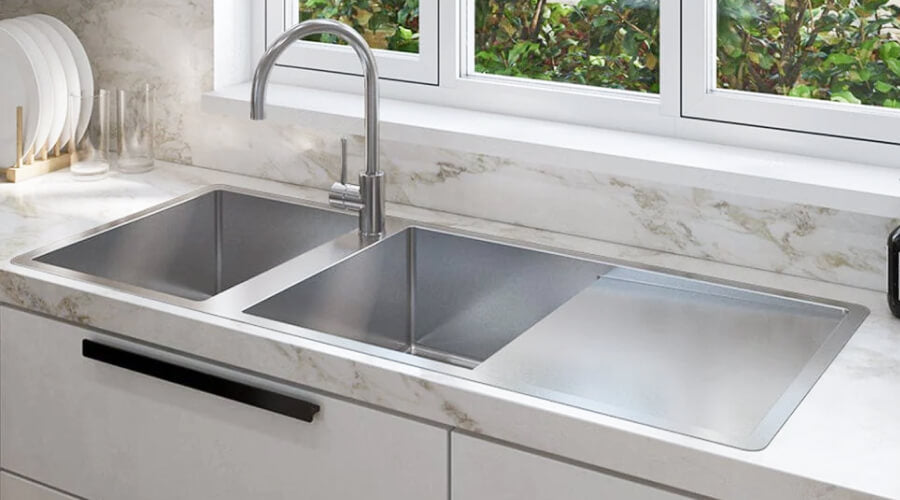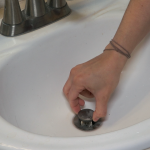Selecting the right sink material for your kitchen is crucial, considering its functionality, durability, and aesthetics. With a myriad of options available, it’s essential to delve into the characteristics of each material to make an informed decision. From classic stainless steel to elegant porcelain, understanding the pros and cons will simplify your sink selection process.
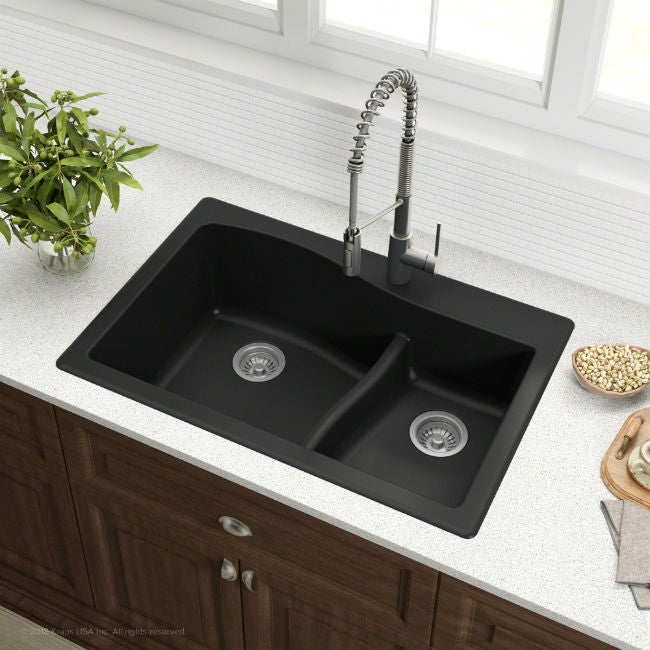
Stainless Steel: The Timeless Choice
Stainless steel sinks remain a popular choice for kitchens, thanks to their durability and affordability. The sleek, modern appearance complements various kitchen styles, making them a versatile option. While they resist stains and corrosion, they may scratch over time. However, higher gauge stainless steel sinks offer increased durability, making them an excellent investment for busy kitchens.
Porcelain Elegance: Beauty with Care
Porcelain sinks add a touch of elegance to any kitchen with their glossy finish and timeless appeal. They are resistant to heat and maintain their shine with regular cleaning. However, porcelain is prone to chipping and scratching, requiring careful handling to preserve its beauty. Despite this, their classic look and durability make them a favored choice for many homeowners seeking sophistication in their kitchen.
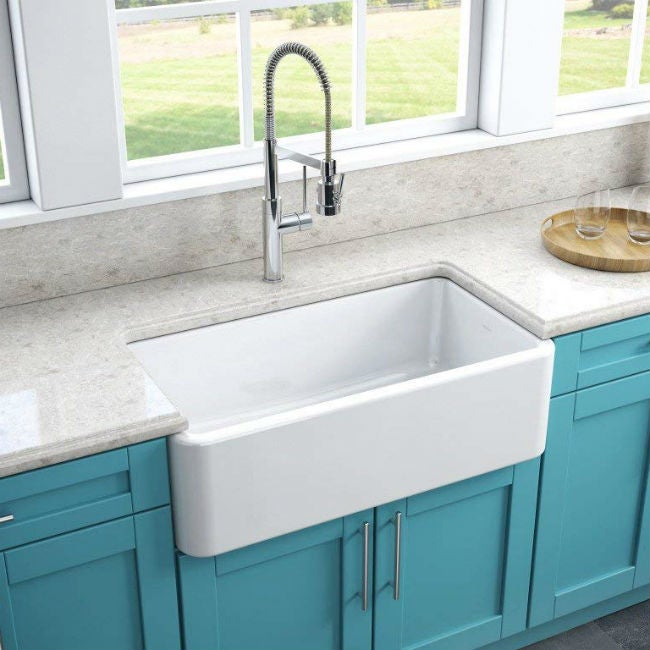
Composite Options: Strength with Style
Composite sinks, made from a blend of materials like quartz, granite, or acrylic resins, offer a balance of durability and style. They come in various colors and textures, allowing homeowners to match them seamlessly with their kitchen decor. Unlike natural stone sinks, composite sinks are non-porous, resistant to stains, and easy to clean. While they may cost more than stainless steel or porcelain, their longevity and aesthetic appeal make them a worthy investment for those seeking both style and functionality.
Cast Iron: The Heavyweight Contender
Cast iron sinks have long been cherished for their durability and classic appeal. Their robust construction resists chipping, scratching, and denting, making them a reliable option for busy kitchens. However, their weight requires sturdy support, and improper installation can lead to cracks in countertops. Additionally, cast iron sinks need periodic re-glazing to maintain their luster, which adds to their long-term maintenance cost. Despite these considerations, their timeless charm and durability continue to make them a preferred choice for traditional kitchen designs.
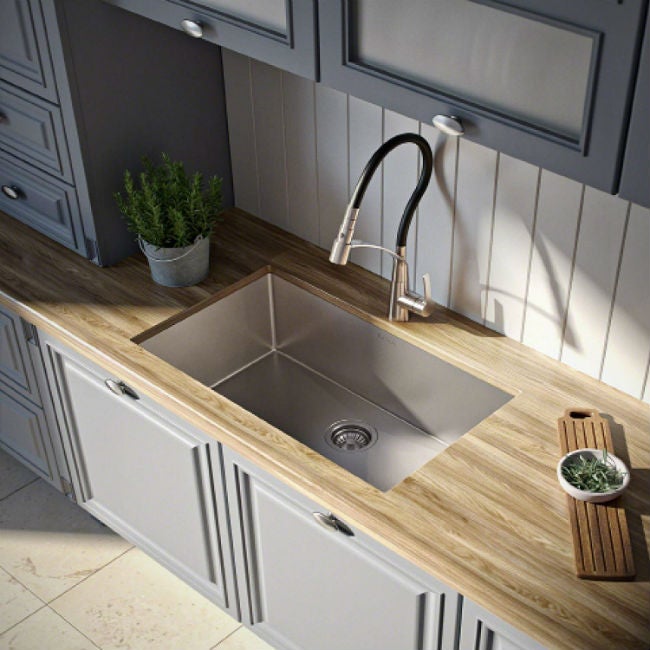
Copper Charm: Beauty in Patina
Copper sinks offer a unique and luxurious aesthetic to any kitchen, with their warm tones and natural patina. They are antimicrobial, inhibiting the growth of bacteria, and their natural patina develops character over time, adding to their allure. However, copper sinks require regular maintenance to prevent tarnishing, and acidic foods can cause discoloration if left unattended. While they may be a more expensive option upfront, the timeless beauty and antimicrobial properties of copper sinks make them a coveted choice for discerning homeowners.
Maintenance Matters: Keeping Your Sink Sparkling
Regardless of the material you choose, proper maintenance is essential to preserve its beauty and functionality. Regular cleaning with mild soap and water is typically sufficient for most sink materials. However, certain materials like copper and porcelain may require specific cleaning agents to prevent tarnishing or staining. Additionally, avoiding abrasive cleaners and harsh chemicals will help extend the lifespan of your sink and maintain its finish.

Considerations for Kitchen Activities
Think about your daily kitchen activities when selecting a sink material. For avid cooks who frequently use heavy pots and pans, a durable material like stainless steel or composite may be more suitable to withstand the wear and tear. Alternatively, those who prioritize aesthetics may opt for materials like porcelain or copper, which add a touch of elegance to the kitchen but may require more careful handling.
Environmental Impact: Choosing Sustainable Options
In today’s eco-conscious world, considering the environmental impact of your sink material is crucial. Materials like stainless steel and composite often contain recycled content, making them more environmentally friendly choices. Additionally, some manufacturers offer recycling programs for old sinks, reducing waste and promoting sustainability. By opting for sustainable sink materials, you can contribute to a greener kitchen and a healthier planet.
Budget-Friendly Alternatives
While high-end materials like copper and cast iron may be appealing, they often come with a hefty price tag. For those on a budget, stainless steel and composite sinks offer cost-effective alternatives without compromising on quality. With advancements in manufacturing technology, budget-friendly options now come in a variety of styles and finishes, allowing homeowners to achieve their desired look without breaking the bank.

Customization Options: Tailoring Your Sink to Your Needs
Many sink materials offer customization options to suit your specific needs and preferences. From integrated drainboards to built-in accessories like cutting boards and colanders, you can personalize your sink to streamline your kitchen workflow. Some manufacturers even offer custom colors and finishes, allowing you to create a unique focal point in your kitchen. By exploring the customization options available for different sink materials, you can design a sink that not only complements your kitchen but also enhances its functionality.
Final Thoughts: Finding Your Perfect Match
In the quest for the best sink material for your kitchen, considering factors such as maintenance requirements, daily activities, environmental impact, budget, and customization options will guide you towards the perfect match. Whether you prioritize durability, aesthetics, sustainability, or affordability, there’s a sink material that meets your needs and enhances your kitchen experience. With careful consideration and informed decision-making, you can enjoy the beauty and functionality of your chosen sink material for years to come. Sink selection simplified, indeed!
Conclusion: Finding Your Perfect Fit
In the quest for the ideal kitchen sink material, understanding the characteristics of each option is paramount. Stainless steel offers durability and affordability, while porcelain exudes elegance with proper care. Composite sinks strike a balance between style and strength, while cast iron sinks boast timeless appeal and robustness. Copper sinks, on the other hand, showcase luxurious charm and antimicrobial properties. By weighing the pros and cons of each material against your preferences and kitchen requirements, you can confidently select the perfect sink to enhance both the functionality and aesthetics of your kitchen. Sink selection simplified, indeed!
